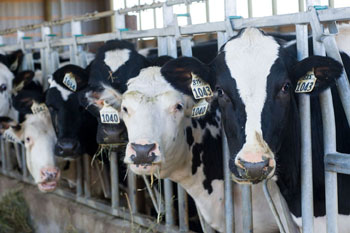Dairy

The Manitoba Dairy Industry consists of approximately 240 producers with an average farm size of 190 cows. Raw milk shipments from dairy farms exceeds 414 million litres annually. All milk produced in Manitoba is processed within the province at eleven plants.
Find other information on financial assistance, environmental programs, animal health and on farm food safety.
Breeding and Reproduction
Quality genetics are fundamental to efficient milk production. The dairy industry has invested heavily in selection programs to consistently improve the yield of dairy cow breeds. Central to a nationwide herd improvement program has been the collection of numerous herd records from individual cows which, alongside trait classification, has produced herds with very high genetic merit. Canadian genetics are sought after worldwide not only for the high production traits but also for the feed conversion efficiency.
Western Canadian Jersey Association
Feeds and Nutrition
Feeding and Health
- Feeding Heat-Stressed Dairy Cows (Nutrition Update)
- Hoof Health and Nutrition
- Preventing Udder Edemas in Dairy Cows (Nutrition Update, Volume 13)
Vitamins, Minerals, Feed Additives and Water
Management
Dairy production requires many management strategies to ensure the production of high quality milk. Managing environment, herd structure and daily farm routine are crucial in sustaining production.
Animal Health and Welfare
Health management programs which address disease prevention and control are essential for dairy production. On farm investments in this area will improve the welfare of the animal and in addition, increase the profitability of the dairy operation.

